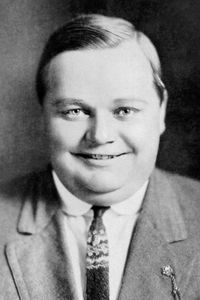Roscoe Arbuckle, the youngest of nine children, was born on March 24, 1887, in Smith Center, Kansas, weighing 16 pounds at birth. His family moved to California when he was just one year old. He began his stage career at the age of eight, performing as an acrobat, clown, and singer with the Webster-Brown stock company.
Roscoe's first professional engagement was in 1904, singing illustrated songs for Sid Grauman at the Unique Theater in San Jose, California, earning $17.50 a week. He later worked with the Morosco Burbank stock company and traveled through China and Japan with Ferris Hartman, making his last stage appearance with Hartman in Yokohama, Japan, in 1913, playing the role of the Mikado.
In 1913, Roscoe joined Mack Sennett's Keystone film studio, working for $40 a week. He appeared in hundreds of one-reel comedies, often playing policemen with the Keystone Kops. He worked with notable stars like Mabel Normand, Ford Sterling, and Charles Chaplin, learning the process of making movies from director Henry Lehrman.
Roscoe began directing some of his one-reels in 1914 and moved up to two-reels the following year. His films included Fatty Again, Mabel, Fatty and the Law, Mabel and Fatty's Wash Day, Mabel and Fatty Viewing the World's Fair at San Francisco, and many more. Keystone took the actors to the real World's Fair to use as background for one of his films, which made the picture look expensive.
By 1917, Roscoe formed a partnership with Joseph M. Schenck, a powerful producer, and the company they formed, Comique, released Roscoe's films through Famous Players on a percentage basis. He soon made over $1,000 a week and had complete creative control over his productions. He also hired a young performer named Buster Keaton, who would go on to have a successful film career.
Roscoe wrote his own stories, tried them out, and then devised funny twists to generate laughs. His comedy star was second only to Charles Chaplin. With the success of Comique, Paramount asked Roscoe to move from two-reel shorts to full-length features in 1919. His first feature was The Round-up, which was successful, followed by other features like Brewster's Millions and Gasoline Gus.
However, tragedy struck on Labor Day in 1921 when Roscoe was arrested and tried for manslaughter charges. He was accused of raping a "starlet" named Virginia Rappe, who fell seriously ill and died three days later from a ruptured bladder. The newspapers, led by William Randolph Hearst, used this incident to generate Hollywood's first major scandal. Roscoe was tried three times, with the first two trials ending in hung juries and the third trial resulting in a "not guilty" verdict.
Despite his acquittal, Roscoe's comedic acting career came to an end. He later found work as a comedy director for Al St. John, Buster Keaton, and others under the pseudonym "William Goodrich." In 1932, producer Samuel Sax signed Roscoe to appear in his first sound comic short films for Warner Brothers, starting with Hey, Pop! He completed six shorts and showed the magic and youthful spirit that he had a decade before.


































